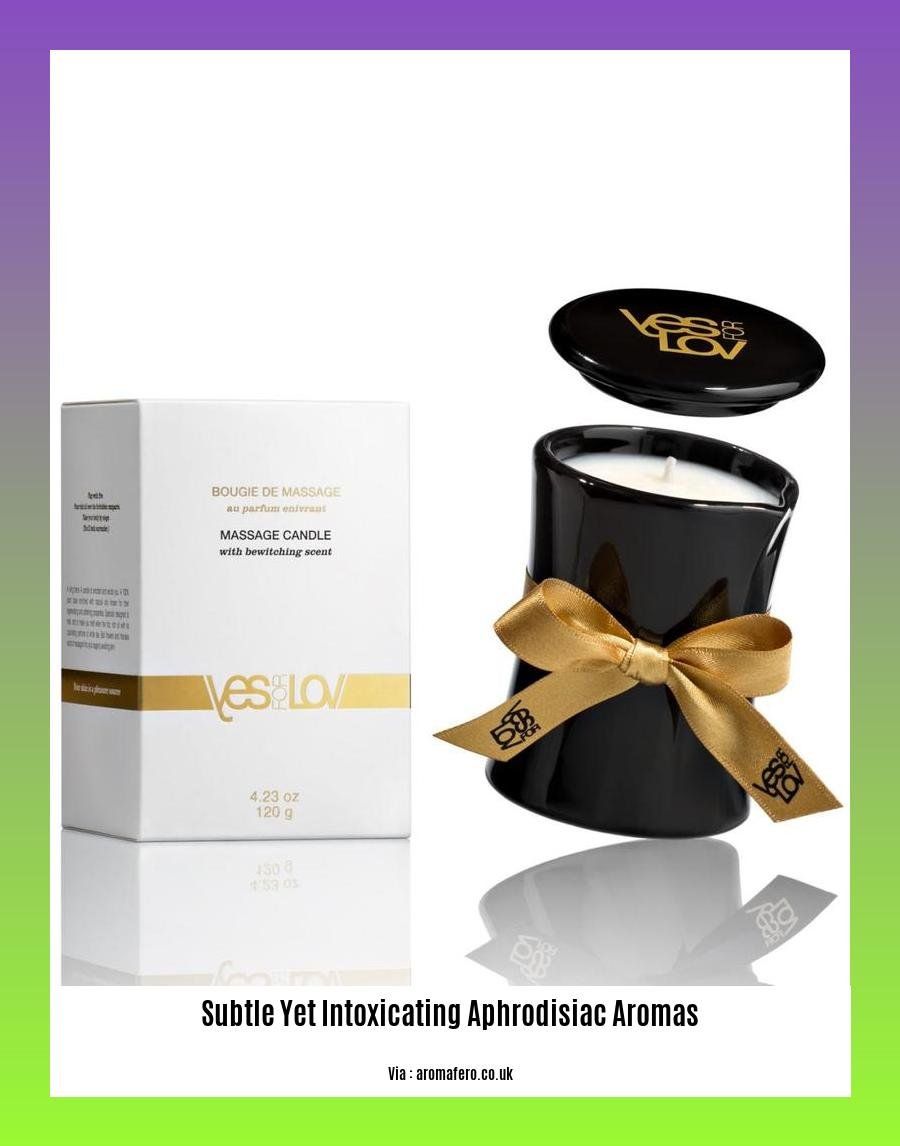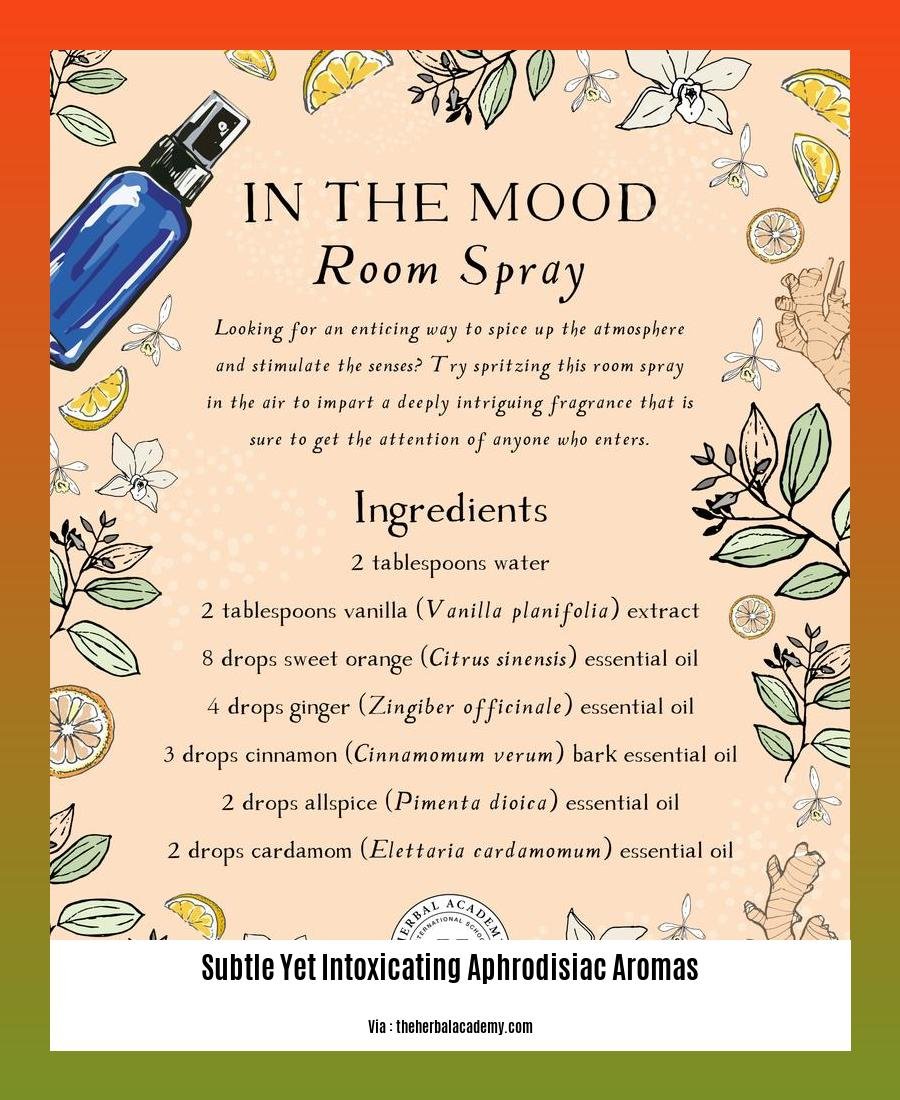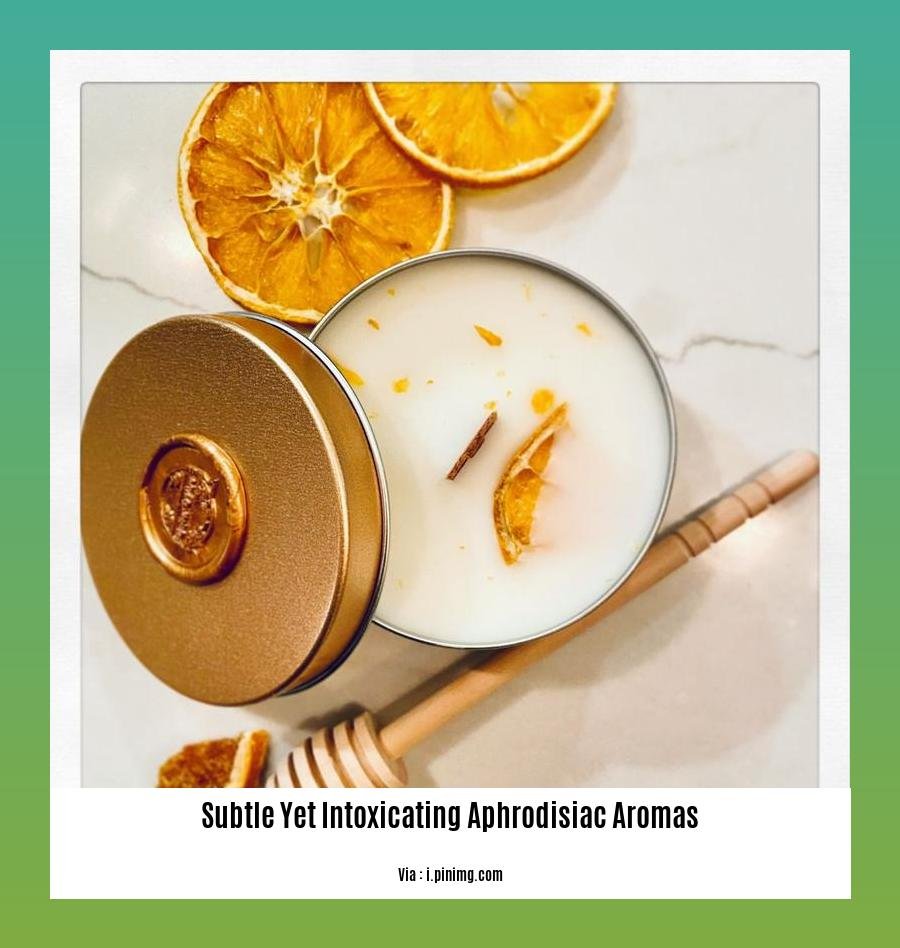Immerse yourself in [The Enchanting Allure of Subtle Yet Intoxicating Aphrodisiac Aromas], an olfactory journey that unveils the captivating power of scents. Prepare to explore the tantalizing realm of fragrances that ignite desire, heighten intimacy, and create an atmosphere of alluring enchantment.
Key Takeaways:

- Aphrodisiac scents aim to evoke desire and enhance intimacy.
- Ancient civilizations used fragrances and certain foods and herbs as aphrodisiacs.
- Pheromones, naturally secreted scents, act as aphrodisiacs in both animals and humans.
- Common scents known for their aphrodisiac qualities include pumpkin, lavender, vanilla, cinnamon, peppermint, ambrette, ylang-ylang, patchouli, sandalwood, musk, bergamot, and chocolate.
- When choosing an aphrodisiac scent, consider personal preferences and scents with known aphrodisiac properties.
Subtle Yet Intoxicating Aphrodisiac Aromas
Since the beginning of time, aromas have held an immense power to fascinate, allure, and ignite desire.
Prepare to be captivated as we venture into the tantalizing realm of subtle yet intoxicating aphrodisiac aromas, where nature’s fragrant offerings possess an uncanny ability to awaken the senses and evoke an irresistible amorous response.
The Ancient Art of Allure
Throughout history, people have harnessed the power of aphrodisiac aromas to enhance romance, ignite passion, and create an atmosphere of enchantment. From the perfumed courts of ancient Egypt to the amorous rituals of the Orient, captivating scents have played an integral role in the art of seduction.
The Science of Desire
Beyond the realm of folklore and tradition, science has unveiled the physiological mechanisms behind the allure of aphrodisiac aromas. These scents stimulate specific receptors in our olfactory system, triggering a chain reaction that involves the release of hormones and neurotransmitters associated with arousal and pleasure.
Unveiling the Elusive Scents
Subtle yet intoxicating aphrodisiac aromas come in an array of enticing forms, each possessing its own unique charm:
-
Floral Fantasies: Jasmine, rose, and ylang-ylang exude an intoxicating sweetness that captivates the senses.
-
Spicy Delights: Cinnamon, nutmeg, and ginger ignite a fiery passion, warming the body and soul.
-
Earthy Enchantments: Patchouli, sandalwood, and amber evoke a sense of mystery and allure, grounding you in the moment.
-
Citrus Sensations: Orange, lemon, and bergamot invigorate the senses, creating an atmosphere of freshness and exhilaration.
Unlocking Their Power
Incorporating subtle yet intoxicating aphrodisiac aromas into your romantic encounters can transform your experiences into unforgettable moments of sensual delight. Consider the following:
-
Create an Intimate Ambiance: Use scented candles, diffusers, or essential oils to fill the air with alluring aromas.
-
Indulge in Fragrant Baths: Add a few drops of aphrodisiac essential oils to your bathwater to create a relaxing and sensual soak.
-
Entice with Perfume: Apply a fragrance with subtle yet intoxicating aphrodisiac notes to your pulse points, creating a subtle yet alluring trail.
Embrace the Enchantment
As you delve into the world of subtle yet intoxicating aphrodisiac aromas, remember that the power lies in their ability to awaken your senses and evoke a profound connection. Whether you’re seeking to enhance romance, ignite passion, or simply revel in the beauty of the olfactory world, these alluring scents will transport you to a realm of sensual enchantment.
Explore our specially curated selection of cologne recommendations for dates that will make you unforgettable in the company of your special someone. Immerse yourself in the alluring fragrances leaving unforgettable impressions](../alluring-fragrances-leaving-unforgettable-impressions) that will captivate your senses and create memories that will last forever. Discover the manly inviting scent signatures](../manly-inviting-scent-signatures) that exude confidence and charisma, making you the center of attention wherever you go.
Specific Aphrodisiac Aromas
Key Takeaways:
- Aphrodisiacs have historically been used to enhance romance and inspire passion.
- Aromas work by stimulating the limbic system, which governs emotions and memory.
-
**Specific aphrodisiac aromas include:
- Patchouli (woodsy)
- Pumpkin (sweet)
- Lavender (floral)
- Vanilla (sweet)
- Cinnamon (spicy)
- Peppermint (minty)
- Ambrette (musky)
- Ylang-Ylang (floral)
- Ginger (spicy)
-
Essential oils can be used in massages or diffusers to create a romantic ambiance.
- Scented massage oils with aphrodisiac properties can heighten arousal.
Citation: InStyle. (2020, July 10). Science-Backed Aphrodisiac Scents to Trigger Arousal.
Practical Applications of Aphrodisiac Aromas
Unveil the power of aromas to ignite desire, enhance intimacy, and create a captivating ambiance.
How to Use Aphrodisiac Aromas:
-
Create an Intimate Ambiance: Set the mood with scented candles or diffuse essential oils like ylang-ylang, sandalwood, or patchouli.
-
Indulge in Fragrant Baths: Immerse yourself in warm water infused with aphrodisiac essential oils, such as rose, jasmine, or geranium.
-
Wear Aphrodisiac Perfumes: Enhance your personal scent with perfumes that feature notes of amber, musk, or vanilla.
-
Massage with Aphrodisiac Oils: Treat your partner to a sensual massage with essential oils like patchouli, cinnamon bark, or cedarwood.
-
Incorporate into Lingerie and Bedding: Spritz aphrodisiac scents on your lingerie or bedding to create an enticing atmosphere.
Key Takeaways:
- Aphrodisiac aromas stimulate desire and enhance intimacy by triggering physiological responses.
- Essential oils with aphrodisiac properties can be incorporated into various applications, including massages, baths, and diffusers.
- Common aphrodisiac scents include ylang-ylang, sandalwood, rose, patchouli, and cinnamon bark.
- Using aphrodisiac aromas effectively can deepen romantic experiences and create a captivating ambiance.
Citation:
Cultural and Historical Significance of Aphrodisiac Aromas
Key Takeaways:
-
Aphrodisiac aromas have been woven into the fabric of human history, used to enhance romantic encounters and deepen emotional connections.
-
Ancient cultures, like the Aztecs and Egyptians, revered specific scents for their ability to ignite passion and desire.
-
The allure of aphrodisiac aromas lies in their ability to stimulate our senses and evoke powerful emotional responses, making them an integral part of cultural rituals and practices.
-
The scientific basis behind aphrodisiac aromas is rooted in their effect on our physiological and psychological responses.
-
A range of aromas, from delicate florals to earthy spices, have been recognized throughout history as potent aphrodisiacs.
Body:
The Cultural and Historical Significance of Aphrodisiac Aromas cannot be overstated. Since time immemorial, humans have harnessed the power of scents to heighten desire and deepen intimacy. Ancient civilizations held bestimmte Düfte in high regard, believing they possessed the ability to kindle passion and enhance romantic experiences. The use of aphrodisiac aromas can be traced back to the ancient Aztecs, who revered vanilla for its intoxicating scent and considered it a potent love potion. Similarly, the ancient Egyptians believed in the aphrodisiac properties of jasmine and often used it in their beauty rituals and romantic encounters.
The allure of aphrodisiac aromas lies in their ability to stimulate our senses and evoke powerful emotional responses. The olfactory bulb, directly connected to our limbic system, plays a crucial role in processing scents and triggering physiological and psychological changes. When we inhale an aphrodisiac aroma, it stimulates the release of hormones and neurotransmitters associated with attraction, desire, and arousal. This intricate interplay between scents and our neurochemistry helps explain why certain fragrances have such a profound effect on our romantic experiences.
Throughout history, a wide range of aromas have been recognized as potent aphrodisiacs. Delicate florals like jasmine, rose, and ylang-ylang have long been associated with love and sensuality. Earthy spices such as cinnamon, nutmeg, and ginger have been used to create a warm and inviting atmosphere, conducive to romance. Even the fresh scent of citrus fruits like oranges and lemons has been known to have an uplifting and invigorating effect, enhancing sexual desire.
The cultural and historical significance of aphrodisiac aromas is undeniable. They have played an integral role in courtship rituals, love-making practices, and romantic traditions across diverse cultures. By understanding the power of these intoxicating scents, we can harness their potential to enhance our own romantic experiences and create a truly captivating atmosphere.
Citation:
- The Allure of Aphrodisiacs: Exploring the History and Cultural Significance of Love Potions

FAQ
Q1: What are aphrodisiac aromas?
A1: Aphrodisiac aromas are scents believed to arouse sexual desire and enhance intimacy.
Q2: How do aphrodisiac aromas work?
A2: Aphrodisiac aromas stimulate the limbic system, which is responsible for emotions and memory, influencing sexual behavior.
Q3: What are some examples of subtle yet intoxicating aphrodisiac aromas?
A3: Some subtle yet intoxicating aphrodisiac aromas include vanilla, patchouli, and rose.
Q4: Where have aphrodisiac aromas been historically used?
A4: Aphrodisiac aromas have been used historically in diverse cultures, including in ancient Egyptian practices and the Kama Sutra.
Q5: What are the potential benefits of using aphrodisiac aromas?
A5: Aphrodisiac aromas can enhance emotional responses, reduce anxiety, and potentially trigger physiological responses that affect sexual desire.










